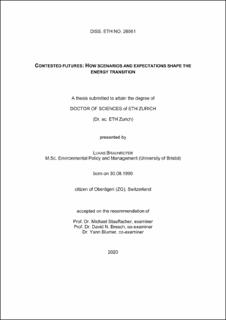Please use this identifier to cite or link to this item:
https://doi.org/10.21256/zhaw-21451| Publication type: | Doctoral thesis |
| Title: | Contested futures : how scenarios and expectations shape the energy transition |
| Authors: | Braunreiter, Lukas |
| Advisors / Reviewers: | Stauffacher, Michael Bresch, David Blumer, Yann |
| DOI: | 10.3929/ethz-b-000440040 10.21256/zhaw-21451 |
| Extent: | 179 |
| Issue Date: | 2020 |
| Publisher / Ed. Institution: | ETH Zürich |
| Language: | English |
| Subject (DDC): | 333.79: Energy |
| Abstract: | Tackling the climate crisis creates an increasing necessity for many countries to achieve system-wide transitions from fossil fuel based energy carriers to renewable energy sources, while maintaining a secure and affordable energy supply. The decisions required for the realisation of these energy transitions are associated with deep uncertainty and a range of interdependencies. Consequently, many energy system actors require credible knowledge about plausible consequences of potential decisions. Against this background, scenarios based on sophisticated computer models are used to support longterm strategic decisions in the energy sector. Energy scenarios, which often have a techno-economic focus, can highlight feasible transition pathways to compare intended and unintended consequences associated with multiple alternative energy futures. Despite their key function in the climate-energy nexus, empirical evidence on how and by whom energy scenarios are used is rare. This dissertation addresses this research gap with five research contributions that explore whether and how energy system actors interact with energy scenarios. Three papers study how key energy system actors (namely fossil fuel companies, utilities and researchers) select, interpret and use energy scenarios. Two papers explore the publics’ energy system expectations, assessing their relevance for the acceptability of energy policy and energy infrastructure as well as evaluating their compatibility with energy scenario projections. Thereby, this dissertation provides insights on the interdependency of formal and informal conceptualisations of the energy future shaping the energy transition. An explorative research design, which essentially consists of in-depth interviews and surveys, was applied. Paper I shows that fossil fuel companies develop and promote those energy scenarios that portray a vision of the energy future that is desirable from their perspective. This tendency to use energy scenarios that are already well aligned with the corporate strategy can also be observed among utilities, which are studied in paper V. Most utilities are more likely to refer to energy scenarios projecting incremental changes to the energy system than to scenarios outlining radically different energy futures. Overall, however, for utilities using a variety of scenarios from different actors played a larger role for the selection of scenarios, as they perceived the diversity of perspectives provided by energy scenarios to be valuable. Paper II focuses on researchers, showing that also this actor group regularly refers to energy scenarios, for example to highlight the relevance of a particular research field or by using scenarios as a data source. Accordingly, researchers have a key role in the dissemination of energy scenarios. This is important because the authority of energy scenarios ultimately depends on their uptake by relevant actors. The more actors adhere to a certain scenario and act accordingly, the more likely its projections become. Because public support is a key requirement for various aspects related to the energy transitions, it is important to know how the expectations of the public compare to the projections of energy scenarios. Paper III found that the publics’ energy system expectations influence the acceptability of the energy transition as a whole, but not the acceptability of concrete energy technology deployment options. How expectations influence opinion-formation processes has so far predominantly been analysed in transition studies focusing on expert communities. This is why paper IV studied the publics’ energy system expectations in more detail, identifying different expectation clusters that represent unique combinations of promises and concerns related to the energy future. These clusters differ in varying aspects and to dissimilar degrees from the scenario projections that informed the Swiss Energy Strategy 2050. This dissertation empirically demonstrates that energy scenarios are not only used to project plausible future developments, but also to gather support, mobilise investment or connect actors in the present. While the content of energy scenarios is future oriented, their main purpose is informing and influencing present-day actors. Developed by actors with contrasting interests, energy scenarios compete to shape the perceived feasibility and desirability of energy futures. Consequently, research on energy scenarios needs to move beyond the predominant focus on their analytical capacity to project techno-economic energy system characteristics. Instead, the social context and embeddedness of their use should be at the centre of future research trying to understand the purpose of energy scenario use and its relevance for the energy transition. |
| URI: | https://digitalcollection.zhaw.ch/handle/11475/21451 |
| License (according to publishing contract): | Licence according to publishing contract |
| Departement: | School of Management and Law |
| Organisational Unit: | Institute of Innovation and Entrepreneurship (IIE) |
| Appears in collections: | Publikationen School of Management and Law |
Files in This Item:
| File | Description | Size | Format | |
|---|---|---|---|---|
| 2020_Braunreiter_Contested-Futures_Dissertation.pdf | 1.98 MB | Adobe PDF |  View/Open |
Show full item record
Braunreiter, L. (2020). Contested futures : how scenarios and expectations shape the energy transition [Doctoral dissertation, ETH Zürich]. https://doi.org/10.3929/ethz-b-000440040
Braunreiter, L. (2020) Contested futures : how scenarios and expectations shape the energy transition. Doctoral dissertation. ETH Zürich. Available at: https://doi.org/10.3929/ethz-b-000440040.
L. Braunreiter, “Contested futures : how scenarios and expectations shape the energy transition,” Doctoral dissertation, ETH Zürich, 2020. doi: 10.3929/ethz-b-000440040.
BRAUNREITER, Lukas, 2020. Contested futures : how scenarios and expectations shape the energy transition. Doctoral dissertation. ETH Zürich
Braunreiter, Lukas. 2020. “Contested Futures : How Scenarios and Expectations Shape the Energy Transition.” Doctoral dissertation, ETH Zürich. https://doi.org/10.3929/ethz-b-000440040.
Braunreiter, Lukas. Contested Futures : How Scenarios and Expectations Shape the Energy Transition. ETH Zürich, 2020, https://doi.org/10.3929/ethz-b-000440040.
Items in DSpace are protected by copyright, with all rights reserved, unless otherwise indicated.